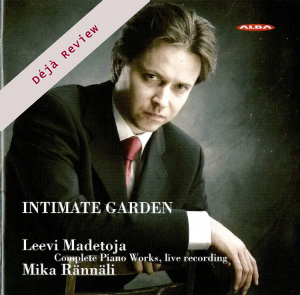
Déjà Review: this review was first published in August 2005 and the recording is still available.
Leevi Madetoja (1887-1947)
Intimate Garden
The complete works for solo piano
Mika Rännäli (piano)
rec. live, 15-16 May 2004, Tulindberg Hall, Oulu Music Centre, Finland
Alba ABCD206 [2 CDs: 81]
Having recorded his orchestral music the Finnish company Alba now turn to Madetoja’s piano music. Here are the complete works taken down from live performances in Oulu.
The 1910 Festive March is light-hearted and already shows Gallic tendencies predictive of Poulenc. It does not sound Sibelian in any way. The Six Pieces op. 12 have one foot in superior salon territory but the elusive mood of the Folk Song (CD1 tr. 3) is more substantial. The Minuet has the same jaunty tone as the 1910 March. A plangent Tchaikovskian and Rachmaninovian nostalgia meshes with Fauré-like subtlety in the Romance (CD1 tr. 7). The Three Pieces Op. 17 are from the same year and unsurprisingly are akin to the Op. 12 set. The Five Miniatures Op. 21 are from two years later but already the music has become less salon-generic, more personal and gentle yet still with a Tchaikovskian delicacy. The fragile chiming of the starry Nocturne (CD1 tr. 13) can hold its head up in any recital and is quite a discovery – reaching out towards the night-sky cycles of Urmis Sisask. The Game reminds me of the lighter piano pieces of Gustav Holst while The Children’s March is comparable with the work of Coates. Four Small Pieces are from the same year – the year in which he wrote his masterpiece Symphony No. 2 (do try the Warner Apex recording – superior to all the competition). Madetoja here excels in The Shepherd’s Dream and A Little Tale. The other pieces take us back to the jauntiness and grotesqueries of the Festive March. The final piece in the set, A reminiscence, has a gentle lilt (Fauré perhaps). It is heavy with the fragrance of summer gardens and again is decidedly French in feeling. Morning from his Suite Pastorale is in much the same contented cradling. Caprice is a sort of gnomes dance with romantic Godowskian asides. He gives us pause with the Legend (CD2 tr. 3) with its sorrowing undercurrents like a cross between a Skazka by Medtner and a Fauré ballade. The concluding Waltz is a more conventional essay in grand hotel gestural splendour. The Garden of Death dates from Madetoja’s fullest maturity. It is his most sensitive statement for solo piano. There are three movements. The first, Andante andantino is tellingly melancholic, reflecting in its dedication and substance the death during the Finnish civil war of Madetoja’s brother Yrjö. This is frankly marvellous music-making and very poignant. It nonchalantly casts off the sepia of almost ninety years and releases emotion as fresh as a teardrop yet steering away from queasy sentimentality. The poco lento is nonchalant and of lesser standing than the Andante. Madetoja return to form with the final Berceuse with its poetic romance providing symmetry with the opening andante. The very short Freedom March is jolly and perhaps a bit jingoistically tawdry. The Five Piano Pieces from 1931 include a Grieg like Tempo di Menuetto with a flavour of the Écosse about it. The Canzonetta has the Purcellian sadness of pieces from Howells’ Clavichord books recently reissued on Hyperion Helios. The Allegro Scherzando smacks of Mussorgsky’s Unborn chicks. The second disc closes with a well-rounded envoi in the shape of the 1915 Lullaby – and by now we already know that Madetoja is most at home in his piano music with Lullabies, Nocturnes and Andantinos.
As Madetoja makes his floral way the best of these pieces remind me of Peterson-Berger’s Frösöblomster and the miniatures of Macdowell and Cyril Scott.
This valuable set is most naturally recorded with the piano sound appositely soft and endearing. Rännäli seems a fine advocate for this music which variously is both a cut above and a cut below that of Macdowell, Cyril Scott, Bax and the Australian impressionists such as Mirrie Hill, Frank Hutchens and Margaret Hyde. Rännäli is a fine advocate well attuned to the music and its endearingly soft melancholia.
Rob Barnett
If you purchase this recording using a link below, it generates revenue for MWI and helps us maintain free access to the site


Contents
Juhlamarssi, (Festive March) Op. 5 no 1 (1910)
Kuusi Pianokappaletta, (Six Pieces for Piano) Op. 12 (1912)
Pianosävellyksiä, (Three Pieces for Piano) Op. 17 (1912)
Pienoiskuvia pianolle, (Miniatures for Piano) Op. 21 (1914)
Pieniä Pianokappaleita, (Four Small Pieces for Piano) Op. 31 (1915)
Pastoraalisarja, (Suite Pastorale) Op. 34 (1916)
Kuoleman puutarha, (The Garden of Death) Op. 41 (1918–1921)
Vapauden Marssi, (Freedom March) Op. 42 no 4 (1918)
Pianosävellyksiä, (Piano Pieces) Op. 65 (1931)

















